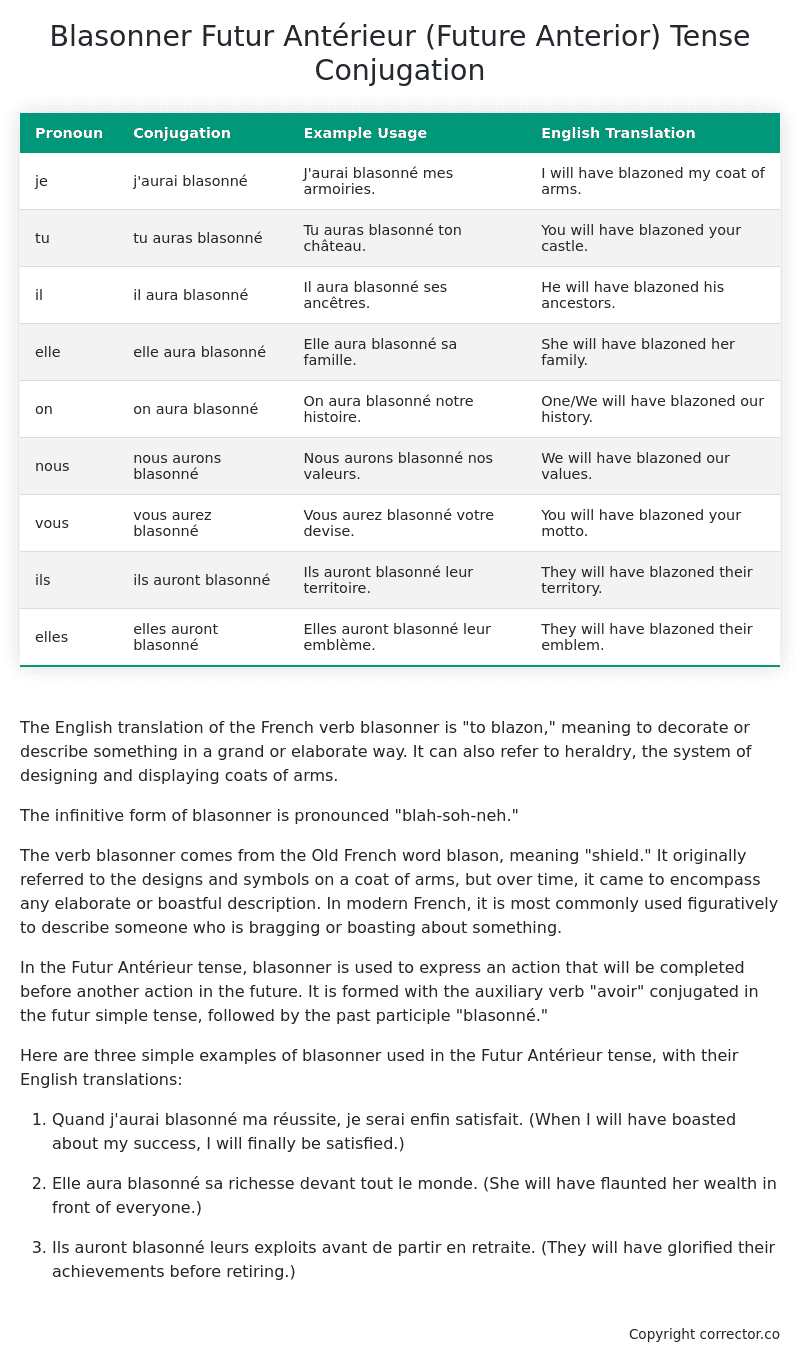Futur Antérieur (Future Anterior) Tense Conjugation of the French Verb blasonner
Introduction to the verb blasonner
The English translation of the French verb blasonner is “to blazon,” meaning to decorate or describe something in a grand or elaborate way. It can also refer to heraldry, the system of designing and displaying coats of arms.
The infinitive form of blasonner is pronounced “blah-soh-neh.”
The verb blasonner comes from the Old French word blason, meaning “shield.” It originally referred to the designs and symbols on a coat of arms, but over time, it came to encompass any elaborate or boastful description. In modern French, it is most commonly used figuratively to describe someone who is bragging or boasting about something.
In the Futur Antérieur tense, blasonner is used to express an action that will be completed before another action in the future. It is formed with the auxiliary verb “avoir” conjugated in the futur simple tense, followed by the past participle “blasonné.”
Here are three simple examples of blasonner used in the Futur Antérieur tense, with their English translations:
-
Quand j’aurai blasonné ma réussite, je serai enfin satisfait. (When I will have boasted about my success, I will finally be satisfied.)
-
Elle aura blasonné sa richesse devant tout le monde. (She will have flaunted her wealth in front of everyone.)
-
Ils auront blasonné leurs exploits avant de partir en retraite. (They will have glorified their achievements before retiring.)
Table of the Futur Antérieur (Future Anterior) Tense Conjugation of blasonner
| Pronoun | Conjugation | Example Usage | English Translation |
|---|---|---|---|
| je | j’aurai blasonné | J’aurai blasonné mes armoiries. | I will have blazoned my coat of arms. |
| tu | tu auras blasonné | Tu auras blasonné ton château. | You will have blazoned your castle. |
| il | il aura blasonné | Il aura blasonné ses ancêtres. | He will have blazoned his ancestors. |
| elle | elle aura blasonné | Elle aura blasonné sa famille. | She will have blazoned her family. |
| on | on aura blasonné | On aura blasonné notre histoire. | One/We will have blazoned our history. |
| nous | nous aurons blasonné | Nous aurons blasonné nos valeurs. | We will have blazoned our values. |
| vous | vous aurez blasonné | Vous aurez blasonné votre devise. | You will have blazoned your motto. |
| ils | ils auront blasonné | Ils auront blasonné leur territoire. | They will have blazoned their territory. |
| elles | elles auront blasonné | Elles auront blasonné leur emblème. | They will have blazoned their emblem. |
Other Conjugations for Blasonner.
Le Present (Present Tense) Conjugation of the French Verb blasonner
Imparfait (Imperfect) Tense Conjugation of the French Verb blasonner
Passé Simple (Simple Past) Tense Conjugation of the French Verb blasonner
Passé Composé (Present Perfect) Tense Conjugation of the French Verb blasonner
Futur Simple (Simple Future) Tense Conjugation of the French Verb blasonner
Futur Proche (Near Future) Tense Conjugation of the French Verb blasonner
Plus-que-parfait (Pluperfect) Tense Conjugation of the French Verb blasonner
Passé Antérieur (Past Anterior) Tense Conjugation of the French Verb blasonner
Futur Antérieur (Future Anterior) Tense Conjugation of the French Verb blasonner (this article)
Subjonctif Présent (Subjunctive Present) Tense Conjugation of the French Verb blasonner
Subjonctif Passé (Subjunctive Past) Tense Conjugation of the French Verb blasonner
Subjonctif Imparfait (Subjunctive Imperfect) Tense Conjugation of the French Verb blasonner
Subjonctif Plus-que-parfait (Subjunctive Pluperfect) Tense Conjugation of the French Verb blasonner
Conditionnel Présent (Conditional Present) Tense Conjugation of the French Verb blasonner
Conditionnel Passé (Conditional Past) Tense Conjugation of the French Verb blasonner
L’impératif Présent (Imperative Present) Tense Conjugation of the French Verb blasonner
L’infinitif Présent (Infinitive Present) Tense Conjugation of the French Verb blasonner
Struggling with French verbs or the language in general? Why not use our free French Grammar Checker – no registration required!
Get a FREE Download Study Sheet of this Conjugation 🔥
Simply right click the image below, click “save image” and get your free reference for the blasonner Futur Antérieur tense conjugation!

Blasonner – About the French Futur Antérieur (Future Anterior) Tense
Construction
Common Everyday Usage Patterns
Interactions with Other Tenses
For example
Summary
I hope you enjoyed this article on the verb blasonner. Still in a learning mood? Check out another TOTALLY random French verb conjugation!


